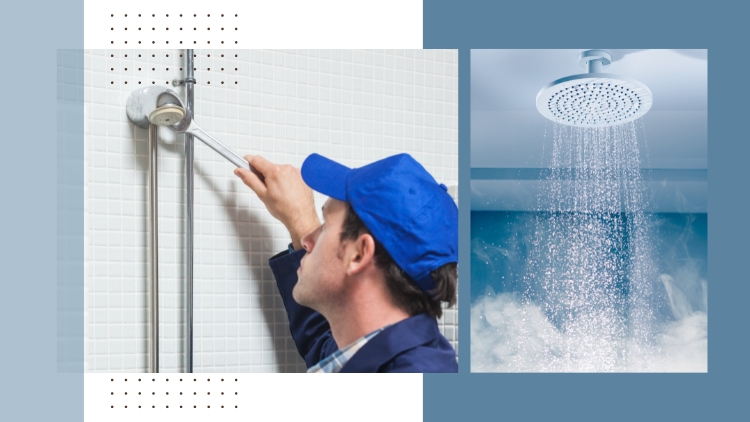We offer a wide range of services for that fresh look, or just maintenance or updates to keep your home functioning and safe. Regardless of the size of the job, we have a craftsman that can tackle it. We offer a wide range of services for that fresh look, or just maintenance or updates to keep your home functioning and safe. Regardless of the size of the job, we have a craftsman that can tackle it.

Plumbing / June 20, 2024

Imagine stepping into your shower at the crack of dawn, looking forward to a comforting stream of hot water, only to be greeted by a disheartening trickle that’s lukewarm at best. This is a frustration familiar to many homeowners, and it’s often indicative of underlying issues within your home’s plumbing repair needs. Our professional team is equipped with the expertise to diagnose and address the root cause of your dilemma, ensuring that your daily routines can proceed with the warmth and vigour you deserve.
With a focus on comprehensive bathroom plumbing services, we are committed to restoring the efficiency and reliability of your system. We understand that your time and comfort are precious, which is why our home maintenance services are designed to provide swift resolutions and lasting results.
In this comprehensive guide, we’ll explore a variety of reasons you might be grappling with slow hot water in your Hamilton home. We then take you through how to identify these issues and address them effectively, ensuring that your next bath is as warm and inviting as can be.
Hot water that peters out isn’t just a personal inconvenience but is indicative of several underlying issues within your plumbing system. It could be something as minor as a malfunctioning part, to a larger issue with your water heater’s health. Before we can fix the issue, we need to understand the potential trouble spots. We’ll dissect your hot water system’s components and outline the signs that point toward the likely culprits.
Your water heater is a complex apparatus with several parts that must be in fine fettle to work correctly:
Many issues can lead to slow hot water, some of which could be:
Understanding the problem of slow hot water is as crucial as finding the right solution. Diagnosing these issues in your home can save you a lot of time and frustration, and it all starts with a few simple observations.
If your hot water varies in temperature, it’s likely that something within your heater is struggling to maintain the set temperature. This could be due to a defective thermostat or a clogged heating element. To get a clearer picture, observe whether this inconsistency happens during peak usage times or intermittently throughout the day. Running hot water from various points in your home can also help determine if the problem is widespread or isolated to specific fixtures.
Another common issue is a reduction in your hot water’s flow rate. This can be caused by several factors. Check the pressure at various fixtures around your home to identify whether it’s a localized problem or one that affects your entire system. Additionally, try running exclusively hot water versus a mix of hot and cold to see if the flow rate changes. This can help pinpoint whether the issue lies with the hot water system itself or with the plumbing.
If you notice your water taking longer than usual to heat up, you could be facing either sediment buildup or a failing heating element. You will want to pay attention to the time between turning on the hot water and when it actually becomes hot. Also, listen for unusual sounds like rumbling from the water heater, which could signal a buildup of sediment.
By taking these steps, you can better understand the root cause of your slow hot water problems. Once you’ve diagnosed the issue, you’ll be in a much better position to seek out the appropriate solution, whether it’s a quick fix or requires professional intervention.

Slow hot water issues aren’t just inconvenient; they can lead to bigger, costlier problems if left unresolved. Here’s how to tackle each likely scenario effectively with professional guidance.
To address sediment buildup:
If you have a large household, you might need a larger water heater
Regular maintenance is key to preventing many slow hot water issues.
There are several symptoms that signal it’s time to call a professional plumbing service for your hot water issues. One of the most obvious signs is visible leaks or dripping from the tank. Water pooling around your heater or consistent drips can indicate a more serious problem that requires immediate attention to prevent further damage.
Another red flag is unusual noises coming from the tank during operation. If you hear banging, clanging, or other strange sounds, it could be a sign of sediment buildup, a failing heating element, or even more significant internal issues. These noises are often a precursor to more severe problems, so it’s best not to ignore them.
Age is also a critical factor to consider. If your water heater is over 10 years old, it may be nearing the end of its lifespan. Older units are more prone to breakdowns and inefficiencies, and proactively replacing an aging water heater can save you from unexpected cold showers and potential water damage.
In these situations, calling in a professional plumber is the best course of action. They have the expertise and tools to accurately diagnose and fix the problem, ensuring your hot water system runs smoothly and efficiently. Plus, a professional can provide valuable advice on whether repair or replacement is the best option for your specific circumstances.
By staying vigilant and recognizing these symptoms early, you can avoid major disruptions and maintain a reliable hot water supply in your home. So, if you notice any of these warning signs, don’t hesitate to reach out to a trusted plumbing service. They’ll help keep your hot water flowing and ensure your home remains comfortable and functional.
Plumbing issues are varied and complex, especially when it comes to your hot water supply. With Handyman Connection, you have a reliable partner to ensure that slow hot water doesn’t become a recurring nightmare. Our expert plumbers are experienced in diagnosing and solving a multitude of plumbing problems, and we stand by the craftsmanship of our work. Trust us to bring back the warm comfort of your home, one faucet at a time.
Dealing with slow hot water can be a frustrating experience, but it doesn’t have to be a permanent one. By understanding the root causes, identifying the issue, and calling in the experts, you can quickly get to the core of the problem and restore the hot water flow that your Hamilton home deserves. Remember, the key to a well-maintained home is taking proactive measures and employing trusted professionals for support. Don’t wait for your next cold shower to make the call—get ahead of the issue and enjoy the full benefits of your hot water system once more.